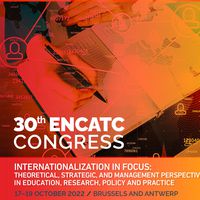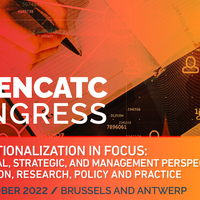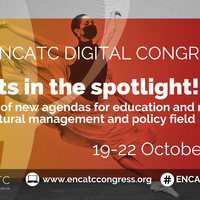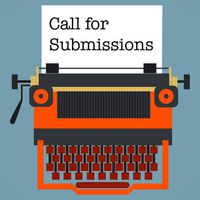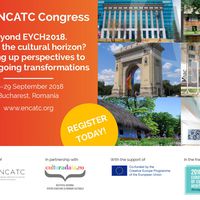Why Internationalisation Matters and How It Can Be Done
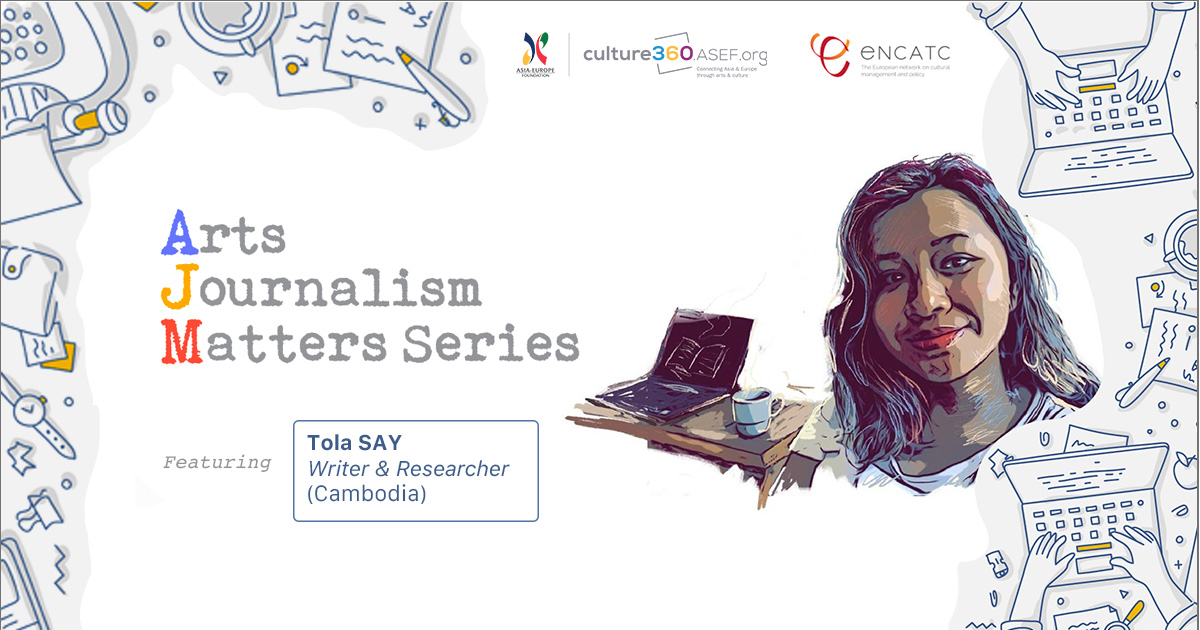
Supported as part of the Arts Journalism Matters Fellowship, Tola Say reports on the key topics and trends from the ENCATC Congress that took place in Brussels last October.
It’s been three years since the world was challenged by an unprecedented health crisis, on top of ongoing issues such as the global economic crisis, climate change, forced migration, racial injustice, etc. People and every aspect of life and society have been forced to face challenges they were unprepared for. But like a silver lining, the pandemic also caused us to understand ourselves deeper and strive to move forward amidst difficulties.
Now that we’ve moved past the pandemic era, it’s time to recover fully. The presence of platforms that inspire people to come together has become a critical avenue to discuss opportunities and collaborations bound to make life better — bound to make the world better. These platforms aim to create stronger communities that can withstand any crisis or social dilemma.
This is also what pushed the Congress of the European Network on Cultural Management and Policy (ENCATC) to gather scholars, researchers, educators, policymakers, cultural managers, and artists from different parts of the world in the beautiful and storied cities of Brussels and Antwerp in Belgium on October 17-19.
Centered around the theme, “Internationalisation in focus: theoretical, strategic, and management perspectives in education, research, policy, and practice,” The 2022 ENCATC Congress is the only global congress dedicated to advancing theory, education, research, and practice on cultural management and policy.
The event started with a welcome speech from Gerald Lidstone, ENCATC President, and opening remarks from GiannaLia Cogliandro Beyens and two cultural representatives from UNESCO and European Commission in the Fondation Universitaire in Brussels. It was followed by a policy debate addressing the challenges and opportunities of internationalisation faced by the cultural sector, mainly in the European context, and how the institutions can address these issues, especially in the post-pandemic era.
Here are some of the key takeaways from the 30th ENCATC congress.
Global Conversation: Decolonising and diversifying internationalisation
The ‘Global Conversation’ highlighted the different approaches taken in addressing new ways of learning and teaching in academic institutions. Presented by seven experts, the panel was significantly dedicated to four approaches, including how to lead a change process of decolonisation, how to identify and engage essential stakeholders, and keynotes on practical approaches integrating cultural arts and social sciences.
ENCATC President, Gerald Lidstone, shared his perspective on the broader definition of decolonisation.
“The need to decolonise is not the question. It is not a matter of what we mean by the term. Once we start to discuss this within faculty, we find that everybody has different opinions about what decolonisation is or what it means. There are no easy definitions.
“We all agree that we probably need new voices in our education entities. But how do we achieve that?”
So, how do we lead a change process of decolonisation that includes students, faculty, artists, audiences, administration, funders, and other stakeholders?
Recent events that shook the world, including the Black Lives Matter and MeToo movements, pointed to an increasing and persistent concern about colonial thinking and the need to advance efforts to address its effects on racial, ethnic, and gender justice.
Lidstone emphasised the critical role academic and cultural institutions play in ensuring these movements are acknowledged and in taking action.
He, however, admitted that there’s no quick fix to tackling these issues. Even when students spend three or four years of undergrad studies, it will take time for fundamental changes to penetrate the system. Practical approaches to decolonisation include integrating cultural arts with social sciences, humanities, and health sciences — and putting weight on these courses.
“Every time we try something new in art management and cultural management areas, we’re all terribly careful not to say or to do the wrong things. […] But if you don’t risk or take chances, you’ll never get it right. Try your best and listen to everybody around you that is giving you input. In my context, students’ inputs are really important to the process.”
Cultural Collaborations Between Europe and Asia
The following session presented some thoughts for reflection from the Executive Director of the Asia Europe Foundation (ASEF), Ambassador Toru Morikawa, whose organisation founded in 1997 brings 51 Asian and European member countries together through its projects.
Amb. Morikawa acknowledged that many ongoing global issues are happening globally, ranging from the current geopolitical context, rising climate crisis, and rapid changes in the post-pandemic world. Hence, it’s more important now than ever to maintain dialogue, exchange ideas, and collaborate. He then shared some of the policy recommendations from ASEF roundtable series on the role of cultural institutions in leading cultural exchanges titled, “Recalibrating the Compass: What Future for Asia-Europe Cultural Relations?”
“First, the project should be designed to address gaps by being more participatory. And this should be integrated into the operations and processes of arts organisations. We should create avenues to bring together small local initiatives, major networks, and international actors, who otherwise would not be in the dialogue.”
He further noted that the recognition and preservation of minority and indigenous cultures, promotion of a rights-based approach in cultural organisations, and fostering fair practices in international cultural exchanges for developing more ethical and socially sustainable cultural exchange are crucial to turning these initiatives into tangible actions that impact the people they’re intended for.
A Push for Art Decolonisation
Alan Salzenstein, professor and director of performing arts management andarts leadership at Depaul University, recognised and honored ancestral and three indigenous tribes in Chicago, where he resides, as he hopes this recognition would encourage and inspire action and commitment toward reconciliation in building relationships with the indigenous community.
He presented the background of establishing the global conversation in 2017, which resulted from the congress of AAAE and ENCATC. Over 30 individuals representing 15 countries and various networks joined the workshop to establish conversations among thought leaders, build networks in cultural management and education and identify common interests and themes across countries (commonalities and intersections).
“Our collective worlds, our collective realities, become closer and more interconnected every day. What we focus on daily and what is meant before us, we also know that international forces impact what we do and what we do impacts the international stage. We cannot live in our bubbles removed from happening in the next city, the next country, or the other side of the world.”
He said that the theme of decolonisation reaches all corners of the globe and all aspects of arts and culture.
“How do we deconstruct colonial ideologies and dismantle structures based upon the privilege of western thoughts and approaches? It’s evident in all aspects of cultural management and the presentation of arts programming, the ecstatic marketing and selling and determination of quality and significance, and administration and support. And these all dictate and feed into education in our curriculum building.”
On the other hand, he said, “we need to deconstruct these ideologies and methodologies. We are in front of the active standardisation of curriculums internationally founded by and based on the global north and western ideologies: how do we reconcile these competing energies? We cannot possibly learn everything that needs to be understood that will result in anything on a grand scale in the ENCATC congress, but that’s the same. Even big waves start with small ripples”.
The session continued with Antonio C. Cuyler, Professor of Music in Entrepreneurship and Leadership in the School of Music Theatre & Dance at the University of Michigan, USA. He began by quoting James Baldwin: “It took many years of vomiting up all the filth I’ve been taught about myself and half believed before I could walk on the earth as though I had a right to be here.” “What filth have you been taught about who you are? What filth do you need to let go of?”
He continued, “We inherit this reality; we didn’t create it. Our ancestors passed it on to us. But we could change our reality through our actions because a system could work when we participate, whether consciously or unconsciously.”
Decolonisation starts with individuals and focuses on what makes us human. Arts and culture are a testament to this. It interrogates the power structures and moves from a capital-centered to a people-centered paradigm. It is shifting the focus to other kinds of capital — spiritual, cultural, social, emotional, and financial.
“Let’s give ourselves permission to interrogate ourselves and actively reflect on the education we receive. If we perceive education as liberation, then we are on the side of decolonisation,” said Antonio Cuyler, chair of the Global Conversation.
A More Inclusive, Diversified Art: Is it possible?
It’s been a privilege and honor to be invited to this Congress, thanks to the joint fellowship programme “Arts Journalism Matters” organised by ASEF through its digital platform culture360.ASEF.org, in partnership with ENCATC. It’s important to note that this newly launched programme was inspired by a one-month virtual residency and mentorship programme in which I took part in April 2021.
As an arts writer, learning and understanding arts and culture from a local perspective is essential. Therefore, platforms and programmes that help to build these capacities are significant. It has been a life-changing experience to attend the eye-opening ENCATC Congress, as it enabled me to understand the critical roles of individuals, organisations, different programmes in academic institutions, and stakeholders in advancing cultural management and policy.
Hearing different perspectives and understanding various topics from educators and researchers widened my view on what arts mean and how it can be used to foster peace, inclusivity, and internationalisation. But while the whole event provided a platform for insightful exchanges, many topics highlighted only the European context, leaving out some vital information about other regions like Southeast Asia.
For future Congresses and to respond to the vision of ENCATC, I believe that an effort to involve more diverse voices should be done.. More importantly, as this Congress is crucial for young researchers and emerging scholars, ENCATC could consider providing subsidized rates to make their programmes more affordable. Some of the panels reflected the critical success of different initiatives designed for students, artists, and cultural practitioners. I hope to see more collaborations and initiatives between Europe and Asia so that artists and arts practitioners in Asia can benefit equally and make their voices heard on the global stage. That practice can also contribute to internationalisation, which embraces diversity, inclusivity, equality, and sustainability.
About the Author
Say Tola is a passionate writer and researcher of arts. She worked for Khmer Times from 2017 to 2019 during which she wrote about the arts scene in Cambodia. She has also worked as the core organising team for the ‘Khmer Literature Festival’. Her keen interest in arts and culture research saw her playing a significant role in ‘Her Sounds’ project as a coordinator in 2019. That year, she also became a resident researcher with Heritage Hub Residency at the REPfest New Traditional Music Festival. In 2020, Tola worked as a research assistant on an international project called “Cambodian Mouth Harp” as part of the Endangered Material Knowledge Programme. All these projects gave her the opportunity to travel throughout Cambodia to witness diverse arts and cultural practices in various communities. Tola has a Bachelor of Arts in International Relations from Paññāsāstra University, Cambodia. Currently, Tola works as a research coordinator with Cambodian Living Arts.
Similar content
from - to
17 Oct 2022 - 19 Oct 2022
posted on
22 Sep 2022
from - to
19 Oct 2021 - 22 Oct 2021
posted on
22 Sep 2022
deadline
02 Apr 2018
from - to
26 Sep 2018 - 29 Sep 2018

